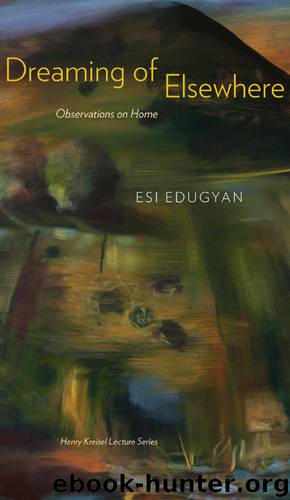Dreaming of Elsewhere by Esi Edugyan

Author:Esi Edugyan [Henry Kreisel Lecture Series]
Language: eng
Format: epub
ISBN: 9780888648365
Publisher: The University of Alberta Press
II
This brings me to the kind of belonging with which I have been most concerned recently, that of citizenship. The Oxford English Dictionary defines a citizen as, “an inhabitant, possessing civic rights and privileges.” That this is not always true should come as no surprise. Citizenship is, in the end, an expression of power. Our First Nations communities have felt this assertion directly, as have our separatists in Québec. Conflicts, one would suppose, are inevitable. But among the many modern examples of nations in conflict with their own citizens, I suspect the abrupt rise and fall of Nazi Germany is most instructive. There are many others, of course: Cambodia, China, the USSR, the United States, to name just a few. Yet Nazi Germany casts a peculiar spell over us, even eight decades later. Historians continue to debate how such a movement came to be embraced. The most reductive simply shrugging, as if to point to humanity’s rather ugly inclination towards aggression, tribalism, or exclusion as some kind of answer. I’m not convinced that this is adequate. And all the while the Third Reich continues to fascinate us with the mysterious ferocity of its evil.
I have been struggling with this for several years. What, I have wondered, was a German citizen in 1932? And what was a German citizen in 1933? The human beings were the same. And yet the citizens were already startlingly, if secretively, different. Germany did not eradicate its own citizens. That would have been appalling. Instead they denied them. Then they eradicated them. My second novel, Half-Blood Blues, explores the fate of one such citizen, Hieronymous Falk, a black German jazz trumpeter, at his peak during the rise of the Third Reich, and my interest in Falk grew quite naturally out of my own life. As James Baldwin once wrote, rather bleakly, “People are trapped in history, and history is trapped in them.”
But more about that shortly.
In 2006, I had already been living in Stuttgart for several months before I came across a reference to the “Rhineland Bastards.” These were the children of white German mothers and black French colonial soldiers, born during and after France’s occupation of the Rhineland in the years immediately following the First World War. Some of the German populace saw the use of black soldiers as a deliberate insult, an attempt to taint the bloodline. The children must have felt that sting. The book I had been reading was interested in the aftermath of that first war, not in the fates of the Rhineland Bastards. A short while later, as I was on the bus returning home, a black woman struggled to get onto the bus with her several shopping bags. The driver—with the aggression so many bus drivers in that city seemed to possess—at once began furiously berating her. She glanced up at him, and said four sharp words back. The bus driver immediately lowered his voice, and replied to her in a respectful tone. I do not know what she said; I do not know what he felt.
Download
This site does not store any files on its server. We only index and link to content provided by other sites. Please contact the content providers to delete copyright contents if any and email us, we'll remove relevant links or contents immediately.
| African | Asian |
| Australian & Oceanian | Canadian |
| Caribbean & Latin American | European |
| Jewish | Middle Eastern |
| Russian | United States |
4 3 2 1: A Novel by Paul Auster(11032)
The handmaid's tale by Margaret Atwood(6836)
Giovanni's Room by James Baldwin(5870)
Big Magic: Creative Living Beyond Fear by Elizabeth Gilbert(4717)
Asking the Right Questions: A Guide to Critical Thinking by M. Neil Browne & Stuart M. Keeley(4564)
On Writing A Memoir of the Craft by Stephen King(4204)
Ego Is the Enemy by Ryan Holiday(3982)
Ken Follett - World without end by Ken Follett(3968)
The Body: A Guide for Occupants by Bill Bryson(3789)
Bluets by Maggie Nelson(3704)
Adulting by Kelly Williams Brown(3663)
Guilty Pleasures by Laurell K Hamilton(3578)
Eat That Frog! by Brian Tracy(3505)
White Noise - A Novel by Don DeLillo(3429)
The Poetry of Pablo Neruda by Pablo Neruda(3358)
Alive: The Story of the Andes Survivors by Piers Paul Read(3302)
The Bookshop by Penelope Fitzgerald(3220)
The Book of Joy by Dalai Lama(3212)
Fingerprints of the Gods by Graham Hancock(3206)
